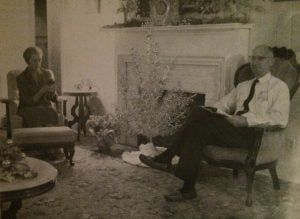Unpacking the Bag
I am a granny. Actually, that’s not exactly right. I am a Mona, a name concocted by my son and daughter-in-law at the approaching birth of their son, Wilson. If you know my first name, then you get it. If not, don’t worry. It’s really not that important to the overall story.
I’ve been very fortunate in that both my children chose to settle in their hometown. So I get to see or hear from them almost every day. To quote Adrian Monk from the television show of the same name, it’s a blessing . . . and a curse. They also attended church with us in the congregation in which they grew up, with the people they’d always known. That was truly a blessing because we generally all sat together and, eventually, Wilson and Anderson, my two adorably precious and ridiculously cute grandsons, would want to sit closer to their grandparents than their parents. By the way, don’t say “ridiculous” in Anderson’s presence; he will tell you we don’t say that word. Being the good Mona that I am, this required the packing of a bag full of stuff—books (particularly “Where’s Waldo” and “Little Monsters”) and small, quiet toys, and stickers and whatever else might occupy them for the forty-five minutes or so of worship. Oh, and gummies. There had to be bags and bags of gummies since, in the minds of a three and a five year old, they are an integral part of any worship service.
But the day came when, for various reasons, both of my children and their spouses chose to affiliate with other congregations. Please don’t misunderstand; I’m not finding fault with their decisions. I know exactly why they did what they did and support completely their choices. What I do not support is the fact that my son took my two grandsons with him when he left. I know. It would be unreasonable for me to think anything different should have happened, and I really don’t think that at all. But now I am forced to be an adult during the sermon, forced to listen with no distractions, forced to try and stay awake with no assistance from little people. It’s not that the preacher is boring; it’s a Shackelford thing. You sit down, you get still, you go to sleep. Period. I don’t think even caffeine directly injected into my veins would help.
Now it’s much easier to get into the building on Sunday mornings. I’m not wagging this big bag around filled with an iPad and a Touchpad (that’s an HP thingy that didn’t fly very well because they decided to write their own apps—and that now no longer exists for that very reason . . . so, of course, that’s what I bought first) and books, and small, quiet toys, and stickers, and gummies. For a while the bag rode around in my van . . . just in case. But the day came when I carried it inside and set it down in the room where the kids’ toys reside when they aren’t there scattering them from one end of the house to the other. Still, it held everything I would need to entertain two energetic little monkeys, just waiting to be put into service—kinda like the suitcase that an expectant mother packs so she’s ready to go when she’s ready to go. But the day came when I knew it was time to unpack the bag.
It was hard—hard to admit that those fun Sunday mornings were a thing of the past. Hard to know that I would not see them running around the building after services, rolling around on the stage at the front of the auditorium and jumping off the steps that led to its child-tempting plateau, generally just missing some older member who was trying to ease through the gauntlet of children and make their escape to the parking lot. I took out the small, quiet toys and added them to the basket that held the other, not so quiet toys. I took out the books, found Waldo on every page, and placed them back on the shelves. I took out the gummies, checked them for an expiration date, and ate a bag. And I cried. Not much, just a little tearing up preceded by the turning of the nose to a brilliant, glow-in-the-dark red. But my heart felt like it was breaking into at least a million pieces, which is the normal reaction to small, almost inconsequential events—comparatively speaking—when you’re old and hormonal.
Yes, I still get to see my Wilson and my Anderson, and for that I am exceedingly grateful. My reason for recounting such an insignificant event is not so I can wallow in self-pity or heap layers of guilt on the heads of their parents (although if that latter just happens to be a by-product . . .). It is to say that grief comes in many forms and from many directions. It doesn’t have to have death as a trigger. Any loss, whether it is that of a loved one or a tradition, a job or material possessions—or your grandsons running to you before the service begins with their arms wide open and smiles spreading from ear to ear—any loss can bring about that empty feeling where nothing seems right anymore and the world has been forever changed. And the size of the loss really doesn’t matter. What does matter is that you acknowledge it for what it is. When that moment comes then the healing can begin.
The post Unpacking the Bag appeared first on Shackelford Funeral Directors | Blog.












